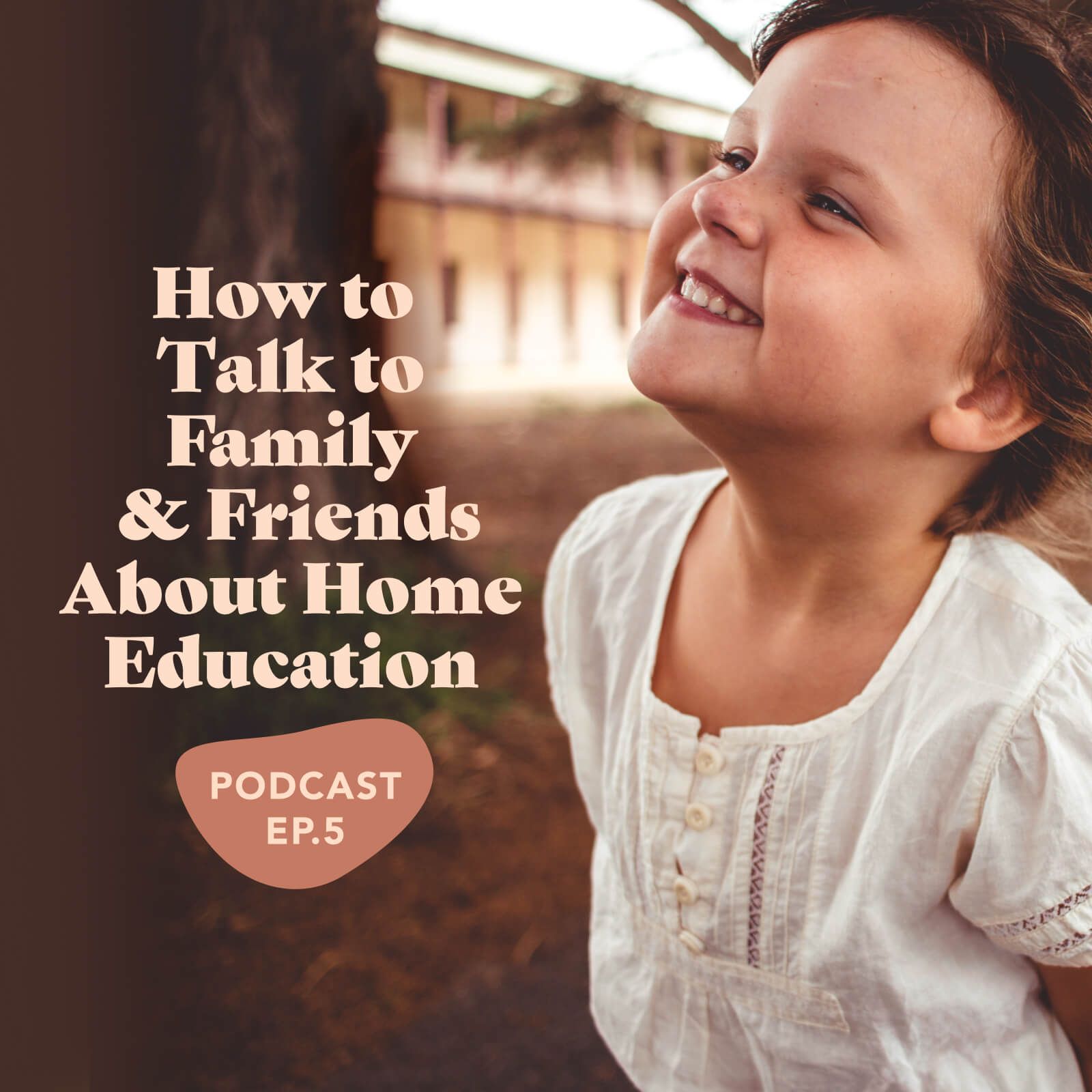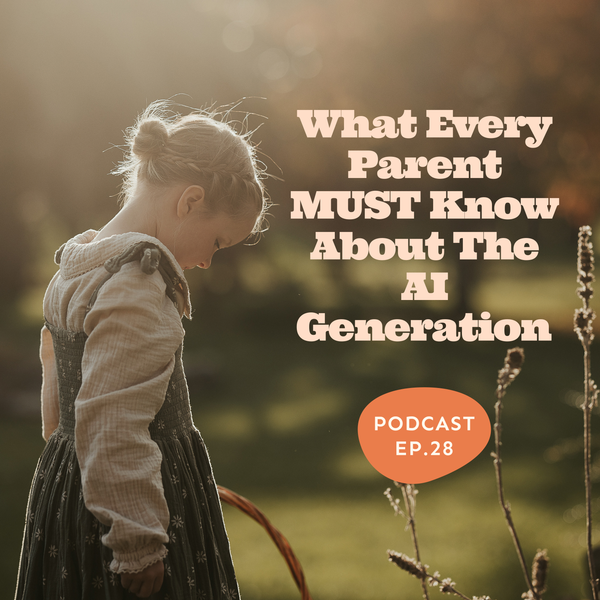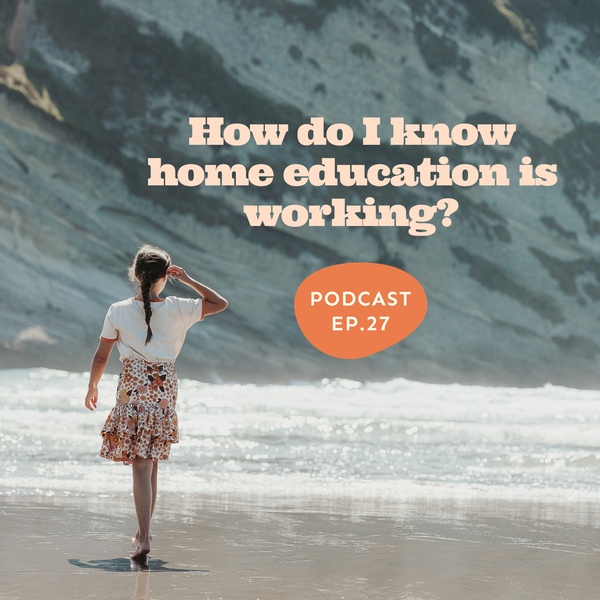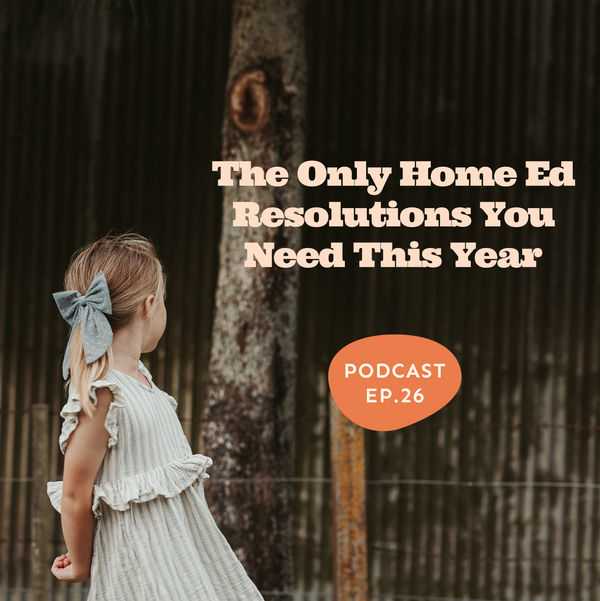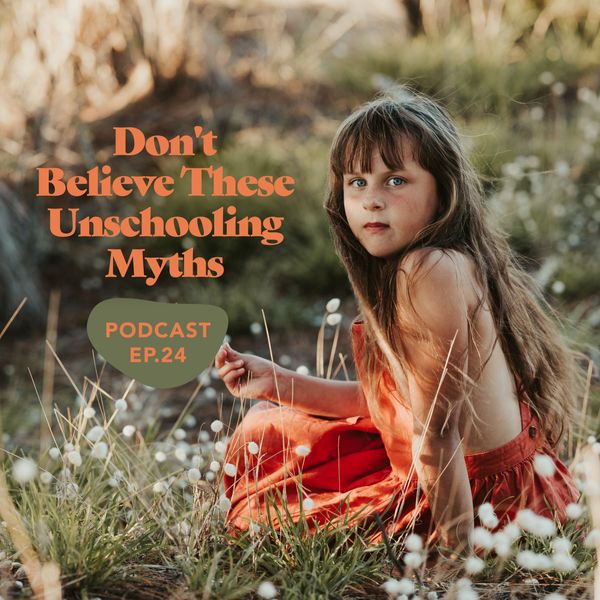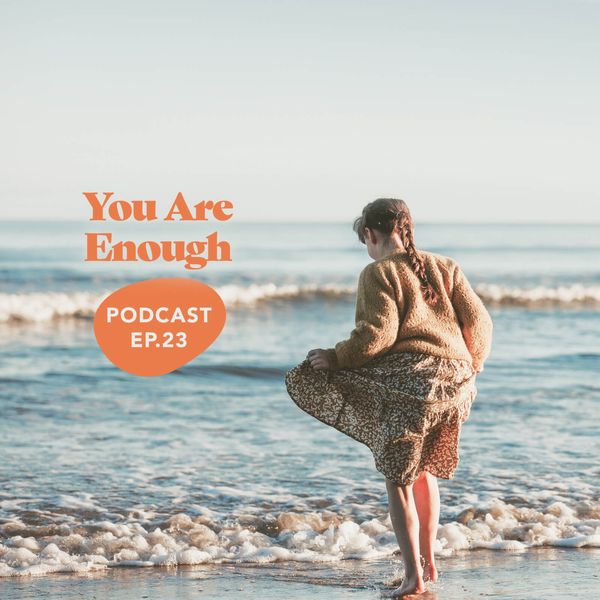One of the things we often underestimate when we decide to live a life without school – regardless of how excited about it we are – is how our family and friends will respond to it. How we’ll talk to them about it, and answer the questions that they’ll probably have. Because despite the growth and awareness in home education recently, we are still very much in the minority, and this path is still very misunderstood.
With so many families joining to this path, I want spend some time today building some tools to help with those family and friend conversations.
These private episodes go even deeper, backed by research, the science of how children learn and grow, and more than a decade of lived home educating experience. Each one is designed to help you rethink, reframe, and recalibrate the way you're walking this path, giving you the confidence to live the version of life you want. The Collection is 23 episodes strong and counting, with over 10 hours of listening available right now.
As a subscriber, you'll also get immediate access to my self-paced course, expert-led masterclasses recordings, five downloadable guides, our school exemption documents, and more 💛
Show Notes
A short coffee read for your parents, or parents-in-law, to help them understand your decision: https://www.starkravingdadblog.com/the-home-schooling-guide-for-grandparents/
Complete Transcript
Helloooo and welcome to the Life Without School podcast, here to help you and your children live the life you want to, not just the one you’re told you should.
I’m Issy, a writer and unschooling dad from New Zealand.
You can find more about me at starkravingdadblog.com, as well as collections of my favourite posts bundled up into encouraging little guidebooks for anyone walking this road less travelled.
Thank you so much for tuning in to listen today. Alright, let’s get into this week’s episode.
MUSIC
Hello hello. I was reading some statistics on homeschooling earlier this week, and the volume of families choosing to move away from a typical schooling environment is just incredible. After growing fairly steadily and consistently over the past 10 years or so, the graph has just taken off in the past 18 months. There’s…a lot going on in the world, obviously, and while it’s bringing us some really big, scary challenges…one of the silver linings is the awareness that’s growing around different ways to provide our children with an education. That it doesn’t have to happen in a classroom, within a school.
But I think one of the things we often underestimate when we decide to take a path like this – regardless of how excited about it we are – is how our family and friends will respond to it. How we’ll talk to them about it, and answer the questions that they’ll probably have. Because despite the growth and awareness in home education recently, we are still very much in the minority, and this path is still very misunderstood.
With so many families joining to this path, I want spend some time today building on some tools to help with those family and friend conversations. The actual questions you get asked will differ, from family to family, so I won’t try and cover allllll of those individually (though towards the end of the episode I’ll share how I personally handle a couple of them). But the main thing I want to try and do today is build a…framework, or a foundation, let’s call it…from which we should feel more confident and comfortable talking through *any* of the questions that are thrown our way, as well as making some of those conversations – hopefully – a little bit less scary and tense than they can sometimes be.
Right, let’s go through a few things:
MUSIC
The first building block to this foundation is to put yourself squarely in the other person’s shoes. Remember: most people have never experienced this way of life, know very little about it, and will probably find the fact you’ve chosen it quite surprising.
To give you the feeling I’m talking about, walk with me through a little imaginary story. Close your eyes, if you can. Unless you’re driving…in which case, please concentrate on the road.
Imagine you’re standing in your street, looking around, and everyone has a yellow house. Walk along the street, turn the corner, keep walking, and look at all the houses. Every single one you walk past is yellow. Now zoom out a bit, and look at the suburb you’re living in. Top down, like you’re flying over it. Not only does everyone in your street have a yellow house, but almost everyone in your entire suburb has a yellow house. In fact, there are mostly yellow houses as far as your eyes can see.
Yellow is the clearly the best colour to paint houses. Yellow is the colour we have always painted houses. We don’t necessarily know the ins and outs of why, but it’s how it is. It’s…comfortable…to have a house that’s painted yellow. It’s…accepted…to have a house that’s painted yellow.
Now, drop back down into your street, in front of your own house. Open your garage door, pull out a bucket of bright blue paint and a brush, and get to work changing the colour of your yellow house. Paint it blue, all of it. Every square inch. Now put the paint back in your garage, and sit down on your front lawn with a cup of coffee.
What happens next? Well…a lot of people are going to want to know why you’ve painted your house blue. That’s…not the colour we usually paint houses. Isn’t…yellow…the best colour to paint a house? My house is yellow, my neighbour’s house is yellow, everyone I know has a house that’s yellow…why is your house blue? What are you saying about people who have a yellow house? What are you getting out of having a blue house? Don’t you feel like you’re missing out by not having a yellow house? All the rest of us have yellow houses, I…I don’t understand!
What you’ve done is stir up a whole stack of feelings and responses in the people around you. And the people you know best – your friends and family – are the ones who will be most vocal about it because they’ll feel most comfortable asking you about what’s going on, and will be most concerned about you maybe not doing the right thing, or missing out.
They will be filled with this sudden exposure to the unknown, the uncommon, in someone that’s close to them…and they’ll find it hard to fight that automated human response of feeling a bit defensive about you making a major life choice that’s so different from theirs.
Your decision contradicts one the majority of parents have been making for over a hundred years. And it’s not a minor life choice. School, and a child’s journey through it, is one of the most embedded aspects of society. It is part of the fabric of our lives. It permeates books, and movies, and music, and office chat. It is one of the most common threads in our relationships with others. It is completely intertwined with the identity of being a parent.
And saying you are no longer going to be part of that is a bit like saying you’ve decided to drive on the other side of the road from now on.
It’s…that surprising. And…for family and friends…often that concerning.
So let’s take this as our starting point, as building block number one. Putting ourselves in those shoes of surprise. Using it to get ourselves to a place of understanding, and of patience, and of openness. Yes, you have made a decision for your life, for your children – but human nature means that every one you speak to will reflect that back on themselves, and their own choices.
It’s only by clearly understanding that, and really getting into that headspace, that we can gently counter that resistance.
MUSIC
So now we’re standing in their shoes. We’re imagining what it would feel like to be a person living among a sea of yellow houses watching someone across the road, up on a ladder, painting over all that to make theirs blue.
Because we understand how they’ll be feeling, we’re not feeling defensive, or aggressive, we’re not feeling panicked or rushed…ok, we might be feeling some of those things, this stuff is hard…but we’re seeing it from their side. We’re patient. We’re respectful.
The next block to build into our foundation is helping our friends and family understand what it feels like to stand in our shoes. To get it across that…it’s not that we don’t like yellow houses, it’s just that we really need a blue one. It just…fits us best.
Choosing to homeschool or unschool is usually a very personal decision. Usually, it has everything to do with you, and your children, and your own family’s life circumstances and experiences, and very little to do with anyone else. And I think this is probably the most important point for your friends and family to understand.
It’s not that you believe they have made the wrong choice in sending their children to school. It’s that, for whatever reasons you hold dear, for whatever reasons were particularly significant and important to you, choosing a different life path is what you believe is the right thing for you, your children, and your family. And you’ve put in much consideration and soul searching to get to that point.
I can’t stress this enough. It’s so, so important to be clear that your choice is not a reflection on them. It is all about you. Because if you want to have an open conversation, you can’t frame any of this as a direct questioning of their life choices. You can’t start tearing down the school system, and expect them to suddenly see it all clearly. The second you try and do that, the second their mind will completely shut off in self-defence.
So let’s bring out that reason, or those reasons, that are significant and important to you.
It might be the fact your child has had some really stressful times in the classroom, and you’ve decided that a different space for them would suit who they are in a much better way.
It might be that your child is distinctly non-academic, and you’ve decided to spend time building on other things they’re really good at instead.
It might be that you like to travel a lot, and you find it far less disruptive to not jump in and out of school when you’re doing that.
It might be that high levels of testing and assessment have caused high levels of stress and anxiety in your child, and you’ve decided that trade-off is just not worth it.
It might be that you saw changes in your child after they started school that neither they, nor you, were comfortable with. And so you’re choosing a different path.
It’s…about you and your child. Not about them, and theirs.
Of course, all of these will lead to specific questions that you’ll have to be ready to answer, because even though you’ve made it about yourself there will probably still be some self-protecting defensiveness in there. It would be…surprising…if there wasn’t. It’s just part of being human.
Liiiike with that first one – about those stressful times in the classroom, and the fact you’ve decided to give your child a different space – that will probably lead to questions or comments about resilience, and how that’s important, and how you’ll make sure your child is actually prepared for the cold, harsh world, because…that makes it easier to justify the fact their child might be going through something similar, but they won’t, or simply can’t, be doing anything to protect them from that.
Or the one about tests, and assessments, and how on earth your child will ever gain a qualification if they don’t go through all that…because, that’s something they would worry about for their child.
And so on. You will, at some point, with some one, end up getting into the details on some of those answers. But before you do, get those two building blocks in place: put yourself in their shoes, and then make sure you put them in yours.
Focus on reinforcing, respectfully but firmly, that this is a choice you have made for your child. It does not impact anyone other than your family, and your decision is a considered, reasoned, carefully made one specific to your own life.
With that foundation in place, it should – often enough to make a difference, at least – suck most of the defensiveness and punch out of the questions that get thrown at you.
MUSIC
Right, with all that said, and as promised, I’m going to give you my rough responses to a few of the biggest concerns family and friends have had for us. Because while we’ve just gone through the importance of making sure both sides of the conversation understand this is a personal choice, for personal reasons, there will probably still be some worries you should prepare to break down. Usually, these come from your parents, or your parents-in-law, because we’re talking about their precious grandchildren here. And I think, for their sake, it’s nice to try and give them some reassurance and comfort on a few things.
The first of those, is the worry that our children will fall behind, or suffer, academically.
Now, the way I want to answer this is to talk about my belief in the unimportance of that academic focus, and where I think children should be spending their time instead. But that’s not going to help. It’s…too much of a shift in thinking. Don’t talk about the yellow house you don’t like. Talk about the blue one you do.
What *I* do is talk about the science behind the time it takes to learn something. How, as a home educating family, we get to set our own pace, and how we get to leverage what research says is the best way to learn. It’s often called distributed practice, and it means short, sharp, intense bursts of researching or studying or practicing something, followed by breaks that lasts as long as you feel they need to – could be an hour, or a day, or a week, or a month – followed by another intense burst…repeated, and repeated, over a long period of time. This approach leads to better comprehension, retention, and skill development in whatever you’re using it for. It’s…simply a better, and faster, way to learn.
You could genuinely – if you decided it was important, and that you needed to – learn the ins and outs of every mathematical concept schools teach our teenagers from the age 13 to 18 in…one year. Probably, in less time than that. If you wanted to. If, you decided you needed to.
Children in school aren’t learning what they’re learning each year because that’s how long it takes to learn all that, it’s…because that’s how long they need to spend on it, when you mix in all the children, and subjects, and changing of classes, and assemblies, and tests, and…all that stuff.
The point is that by choosing a life without school, you get to learn faster and deeper…because you can slice the blocks of time you spend on it in ways that work best for you and your brain. And, so, falling behind academically…it just isn’t a worry for us. We’re leveraging brain science to make it work for us.
The second main question I’ll share one of my responses to is the socialisation one, because…though they don’t usually say it in so many words…evvvvveryone worries your child is destined to become weird. And, because they’re closely associated with your child…that can feel uncomfortable for them personally, too.
My response to this is almost to brush it off, like…nahhhh, that’s just an old stereotype. There’s plenty of studies out there now showing homeschooled and unschooled children who have become mature, well-rounded adults just as connected – and possibly even more connected – to the community around them as school children are, and become. And then I throw in all the places our kids regularly connect with other kids, because, even though socialisation is waaaay broader than just being with other people your age, that’s pretty much what most people mean when they talk about this. That’s…the general definition of being social. So…I throw out the dance classes, karate sessions, drama productions, sports practices…all that stuff we do every week.
And then finish with something like…besides – weren’t you ever told to quiet down in class when you got too chatty, because school’s not a place for socialising? Because I was definitely told to shut up more than once.
Ok, third and final question I’ll share one of my responses to here for now:
In real life, people have to do things they don’t necessarily want to do, and live within structure and schedules they don’t necessarily like, and go through hard things – how are you going to make sure your children are actually prepared for that when they hit the real world?
And my answer to that is that giving them that preparation for life, getting them ready for adulthood, is not something I’m leaving up to chance, and not giving a lot of thought – it’s actually one of my biggest focuses as a home educating parent. And that I don’t believe that there’s only one right way to do that, or go about it. There are plenty of areas of life that will give experiences of structure, and routine, and going through hard things…that’s, life. You don’t need school for all that.
And, again, plenty of homeschoolers and unschoolers have gone before us, with wonderful stories all over the show telling us how capable and comfortable they are in adulthood, and in their careers. It’s just…not something to worry about these days.
Giving these sorts of answers reinforces two things:
1) That this is not a snap decision. It’s a thoughtful, considered, researched one.
And 2) That the home educating stereotypes we’ve all heard of or seen, aren’t really accurate. They’re just…blown out of proportion, and we can move on from them now.
What I’m hoping you’ll take from the way I handle these questions is not what to say, verbatim. It’s the style and tone of the responses that I want to get across. It’s…the focus I put on the blue house that I really love, and not so much the yellow house that other people have chosen.
MUSIC
Making a major life decision that’s very different to most other people is kind of a big deal. It will surprise some people, it will excite some people, and – just because human nature is what it is – it will confront some people. And it will always be those closest to you that will feel those feelings the strongest. They will be the most surprised, the most excited, and…sometimes…the most confronted. And while you don’t *have* to explain why this path is right for you, you will probably find yourself, with some of the people closest to you, feeling like it’s important that you do. Feeling like…you want them to acknowledge, and respect the decision you’ve made. Feeling like…you really want them to understand.
I hope the two building blocks we’ve talked about today – putting yourself firmly in their shoes, and then gently showing them what it’s like to be in yours – helps you work through some of those conversations in a way that achieves all that.
And maybe, one day, if the growth in home education keeps going the way it has been recently, there’ll be less need to explain why you’ve decided to choose a path through life that’s different to almost everyone you know.
Maybe, just maybe, your street will be filled with houses painted in all sorts of colours.
Until then, though, please reach out to me anytime if you get stuck on how to talk about all this. I’ve…learned some things the hard way, and I’d love to help however I can. And don’t forget that my website has some little guides and pocketbooks that make wonderful, easy reads for your friends and family if they’re open to learning more about your decision.
Thank you, as always, for listening today. I’ll see you back here soon.
Bye for now.


